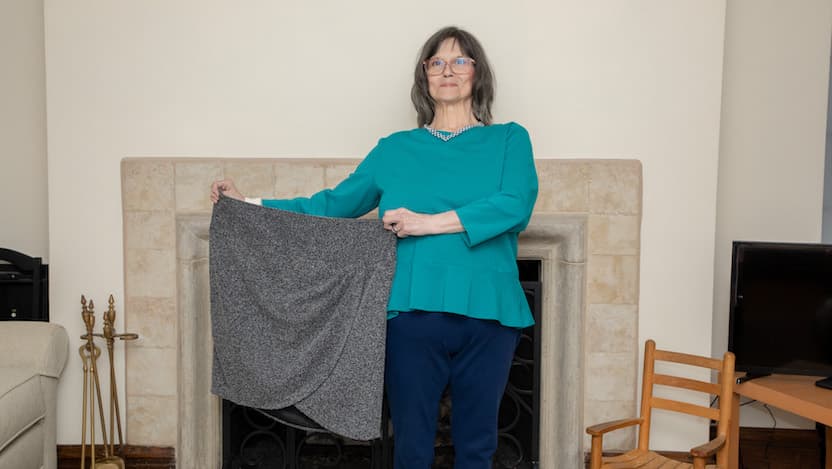Supervised weight loss program helps woman shed 75 pounds — and her wheelchair

Margaret Johnson fought a losing battle against the scale for three decades. Over time, her weight became such a serious issue that the Blue Island resident needed a wheelchair to visit the doctor.
Lifestyle habits and genetic factors weren't to blame. It was the side effects of the many medications that Johnson took to manage her health problems.
Decades later, medications would also contribute to the cure. Thanks to a combination of diet tweaks and weight loss drugs prescribed through the University of Chicago Medicine’s Chicago Weight program, Johnson's wheelchair — and the excess weight — are gone.
"It's amazing how many things are so much easier," said Johnson, 64. "The improved energy level is probably the greatest joy."
Weight gain from pain meds
Johnson was 24 when she slipped on a patch of ice in 1983. The fall caused a tiny bone in her wrist to lodge into her arm's ulnar nerve. It took years before doctors discovered the problem, and during that time she developed severe limb pain known as complex regional pain syndrome (CRPS).
By the time she was diagnosed with CRPS at 28, it had spread to both arms. Eventually, it affected her whole body.
Over the ensuing decades, Johnson was prescribed a range of opioids, steroids, anticonvulsants and antidepressants. All of these medications contributed to her weight gain.
"I went from a size small to medium, to large, extra large, 1X, then 2X, which is the largest size you can get in my favorite brands without special ordering clothes," said Johnson, a retired geography professor.
At her heaviest in 2018, Johnson weighed 230 pounds. She had prediabetes, failing knees, high blood pressure and breathing problems. She needed a wheelchair for most outings because standing was too painful.
Pushing past the plateau
Encouraged by her primary care doctor, Johnson lost roughly 20 pounds in 2018, mostly by cutting calories.
"I worked incredibly hard," Johnson said. "But I didn't see how I could possibly lose more."
She investigated gastric banding, a surgical procedure involving placing a band around the stomach to limit the amount of food that can be eaten. But due to her CRPS, she wasn't a good candidate for the surgery.
That's when Johnson was referred to the Chicago Weight program.
The multidisciplinary team includes obesity medicine experts, dietitians, exercise specialists and psychologists to help create personalized weight management plans for patients with obesity and obesity-related diseases such as diabetes, hypertension, dyslipidemia and obstructive sleep apnea
Program director Silvana Pannain, MD, worked with Johnson on a weight loss plan.
"Weight gain due to medications is very important to recognize and correct, if possible, or at least minimize," Pannain said.
Johnson didn't require much counseling from dietitians or therapists. She knew what to do, but she'd reached a plateau. What she needed was a kick-start to further her weight loss.
Weight loss drugs bring results
Pannain started Johnson on Optifast, a medically-supervised meal replacement, and Victoza, an anti-diabetic medication that can help with weight loss. Johnson lost 40 pounds.
She then switched to Ozempic in June 2022, losing another 10 pounds and dropping from a size extra-large to large in clothing. After switching to Mounjaro in October 2022, the number on the scale continued to decrease, and in the summer she began walking for exercise three to four times each week.
Today, Johnson is down to 135 pounds.
Although Victoza and Ozempic are glucagon-like peptide 1 (GLP-1) drugs designed for type 2 diabetes, doctors have been prescribing them in recent years to treat obesity. Mounjaro is a combination GLP-1 and GIP receptor agonist that is also approved for diabetes.
Both GLP-1 and GIP are hormones released by the small intestine after a meal that help orchestrate, among other things, the release of insulin and a feeling of fullness.
"These new therapies are so effective that they change the patients’ relationship with food," Pannain said. "It's absolutely transformative for many."
Lifestyle changes, new milestones
Johnson continues to take Mounjaro and have one Optifast meal per day, leaning towards a low-carb, vegetarian diet. She no longer uses a wheelchair.
Walking and sleeping are easier, and her blood pressure is back to normal. She's also taking lower doses of pain medications.
Johnson never thought losing weight would cure her CRPS — but it has made life easier.
"When you don't have to worry about your breathing, heart and blood sugar, it takes a big load off," said Johnson, who can now get down down on the floor to play with her two grandchildren.
She wants other people to know how losing weight can change their life.
"I used to be pushed into the doctor's office in a wheelchair," Johnson said. "Now, I can do things without having to hesitate."

Silvana Pannain, MD
Dr. Silvana Pannain is a skilled endocrinologist. She provides advanced endocrinology care for patients who have weight problems or endocrine disorders. Dr. Pannain also serves as director of Chicago Weight, a weight loss program and support group at the University of Chicago Medicine.
Read Dr. Pannain's physician profileChicago Weight: A Weight Management Program for Adults
UChicago Medicine's Weight Management Program is designed to help patients manage excess weight, as well as any associated medical conditions. Our team works with each patient to create an individualized care plan. We offer a full spectrum of services and, depending on your needs, may recommend nutritional and physical activity counseling, psychological and lifestyle counseling, medications, endoscopic bariatric procedures and/or surgery.
Learn more about our weight loss program